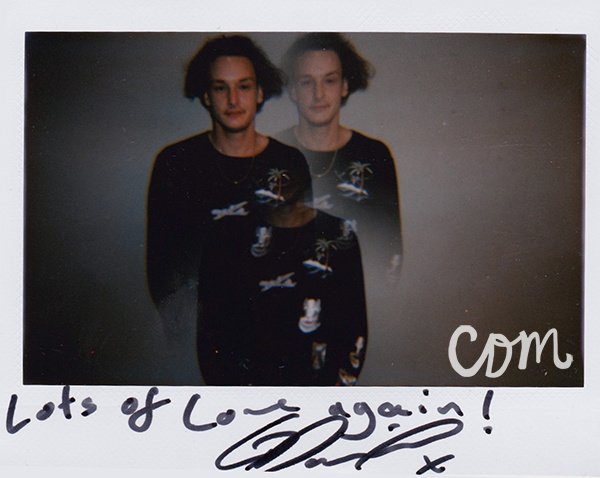Interview: The 1975's George Daniel on music production, their fans, and The 1975 sound.

I’ve said it before, but I’ll say it again, and I’ll keep repeating it until I’m blue in the face - George Daniel is a bona fide musical genius.
The drummer and a co-producer for The 1975, Daniel has proven his weight in gold as a sonic architect countless times, having skilfully manipulated ambient soundscapes on the band's debut album, yet also showcasing his multitalented prowess in masterminding neo-soul brilliance on the transcendent 'If I Believe You', a highlight from the band’s chart-topping latest album, 'I Like It When You Sleep, For You Are So Beautiful Yet So Unaware Of It'.
Coup De Main caught up with Daniel earlier this year, one rainy night in Paris, to discuss everything from his early musical beginnings, to the return of his love for red vines, and his love for The 1975 fandom...
"...We love our fans. I think they’re definitely the best fans out there, out of any kind of community that any artist has. I think we really do have the strongest one at the moment..."

COUP DE MAIN: What's your very first earliest musical memory?
THE 1975 - GEORGE DANIEL: My earliest musical memory I felt quite strongly about was, hearing Fleetwood Mac from my parents. Obviously, everyone, the first music you hear is what your parents listen to. I think it really resonated a lot because it was the first kind of pop music that was-- well, one of the first things that got really, really big, and it was decorated in this ethereal production, as well as being incredibly simple pop songs. It was the first thing that really stirred me. Yeah, that and Meatloaf, those were the first things I remember listening to from my parent’s repertoire.
CDM: At what point did you progress from merely enjoying music to thinking more about the production of music?
GEORGE: Well, I started playing drums a few years before I considered getting into the technical or production side of it. I don’t really know why I wanted to start playing drums, I just did at school, and then I chose to take music technology for the end of school options when you carry on and you do GCSE. So I took music tech, and then I still wasn’t really sure whether I had any kind of talent in it, and I did this film score arrangement for my GCSE exam and got full marks. I was just like, “What?” I thought it was a mistake. I’m not trying to sound humble, I genuinely thought it was a mistake because I remember missing one of the questions in my GCSE listening exam where you have to write down the notation. Afterwards, everyone was like, "What’d you do for that?" And I was like, "I didn’t see that one!" <laughs> And I still got full marks. So that was good. Then I left school, and instead of staying on to do A Levels, I left to do purely music production at college when I was 16, and that’s when it started really, because we were demoing the band at that time, and then I was able to use the studio at college to work on the band stuff and then even use our demos to put forward as my coursework and stuff like that. I still didn’t know what I was doing at this point, and I didn’t really learn-- you don’t really learn that much about production, I mean, you can be taught the basics about how the different technical elements work, whether it’s a computer or an analogue desk in a studio, but I think you only really learn about what is the composition of a production when you leave any education.
CDM: So it’s more like a hands-on education?
GEORGE: Yeah. The times when you learn is when you’re trying to emulate something that you love, that’s where all production ideas come from. It’s either you trying to steal something, or a happy accident where something unintentional happens and you hear it and you go, "I’m going to do that again." There’s a really classic one which is in Logic - the software that I use - where you set a loop, which when it gets to, it might be at the start of the song, and then when it gets to the end of that section it will jump back and play from the first point. And if you set that loop by accident at a different stage and you press play, it’ll play a different portion of the song and then it will loop back. So, often you get these phantom melodies that are in a different structure to what you’ve arranged, just because your loop--
CDM: So it’s both creative and technical?
GEORGE: It’s kind of a technical accident, when that happens.
CDM: At what point in The 1975's existence as a band, did you transition into this producer role?
GEORGE: It was a similar time really, because after I left college I was learning how to use the software and I was just kind of always with Matty [Healy], and we were the ones that were kind of writing, and I guess it just naturally happened in that way because I had a basic understanding of how to get our ideas onto this laptop. I never regarded myself as a producer of the band, until we did... well, until we released music. When we did the EPs, we’d actually already tracked the first record.

CDM: What's the first song you ever produced?
GEORGE: It was off the first ['Facedown'] EP, so it was like, ‘Antichrist’, and ‘Facedown’. We did work with a couple of other people on 'The City' on the first EP, but it was all the EP stuff that I had a fundamental role in. We tracked all of the first record before we put out those EPs - I’m sure Matty probably mentioned that to you before - because then we picked pockets of the record, and we picked the lead-tracks like ‘Chocolate’ from ‘Music For Cars’, and ‘The City’ from ‘IV’, and ‘Sex’ from the ‘Sex’ EP, those were taken from the album and put onto the EPs. It wasn’t really until - that was my point that I digressed from - I was in the studio with Mike [Crossey] when we first met him, that he really wanted to embrace the work that I’d done, and I hadn’t really had that validation before. The only thing I’d had, was Jamie saying, "You can just put out the EP tracks that you’ve done." But Mike wanted to really embrace the nature of all the production that we’d done, which I wasn’t expecting, because we were trying to find someone to make us sound like what we thought we wanted to sound like.
CDM: It’s a lot of responsibility being the sonic architect of a band, but you’ve really grown into that role.
GEORGE: Yeah, I think so, yeah. As with a lot of creative things, if you end up having a kind of sound that people think, "Oh that sounds like The 1975," or "that’s this," or "that’s that," that’s just because of the nature that you do things. You’ll have a kind of method in as to which you apply to all elements of a song, and then it’s a natural thing. So once you’re given a chance to carry on, like, I think anyone would-- I don’t think the band would sound the same, but I think it would’ve taken on a different role if someone else had been in my position.
CDM: Your soundscapes are very distinctly ‘The 1975’, but every song has an entirely different quality. Are there certain sounds that you’ll return to or reuse, or do you try to keep it different each time?
GEORGE: Some elements of what we do is always kind of tried and tested, and then there’ll always be something, like you say, that you try and progress to with each track. So you’ll want to do the drums in a different way so that you can do something that you think is better because you’ll know what you want to do differently, and you’ll know if you’ve done something right from a previous piece of work. For example, the way that we record vocals has always been quite similar, which is to track essentially an organic version of a vocoder - because how a vocoder works, is you sing into it, and then you play the notes that you want it to play. What we’ve always done is recorded each note individually, so that you get this full kind of choral harmony which isn’t totally artificial. And it’s an easy way to initially detach yourself from a piece of music and make the vocals sound quite pretty and nice and digestible, and it allows you to be objective about it when you’re making demos, because you can make vocals sound silky in that way and it hides the tuning because there’s a lot of natural chorus going on. Just stuff like that. That’s the comfort thing, really, that then bled into a permanent method for recording vocals. It’s from our love of electronic and ambient music, and highly manipulated hip-hop vocals, and also in the 80s there was this massive craze of double-tracking and chorus harmonisers, and basically all the analogue versions of what I just mentioned. There’s a really famous effect called Eventide Harmoniser. The Phil Collins, Peter Gabriel vocal-sound, that really spacial--
CDM: Classic pop sound?
GEORGE: Yeah, but super wide! They were the first people to go actual super stereo with their vocals, and it would sound like it was just miles away from all the other music, it was so wide. I was asked about that by a different interview that I did about the A.E. [artificial effects] vocal notes, and yeah, it’s kind of come into fruition as a by-product of like I said, comfort from just being able to make it sound like at home.

CDM: Matty’s spoken about how you came up with the chorus for ‘Loving Someone’. How did the process for the creation of that song work?
GEORGE: That song had a lot of different evolutions. I think I was just messing around with-- because what I do a lot of the time, is if I’m trying to write a piece of melody, I’ll use an old stem of Matty’s voice and then kind of chop syllables up and input the notes into what I’m-- it’s essentially just jamming using stems. I hate to use that word - I don’t listen to a stem and go, "Oh, I want that bit and that bit and that bit," but I’ll drag it in and then chop it up, and then you rhythmically chop something up and you get it into the right key. It’s very easy to then get a succinct part. But yeah, it was just a combination of, I kind of knew that it was a really simple melody that I wanted, and then I managed to just find the notes, and then we-- they weren’t the lyrics in the syllables that I’d cut, but it sounded like that phonetically, <sings 'Loving Someone'>, and I was like, "It sounds a bit like 'Loving Someone’ to me," and then we just went with that.
CDM: You’re such a poet, George.
GEORGE: Yeah! <laughs>
CDM: In the new album bio on your website, it says that Matty recalled a moment during the recording of ‘Nana’ where you said: “Let’s just put a memory in there; let’s just have it open up and your vocal can become distant and you can put a memory in there.” When you’re approaching the production of songs that are so deeply personal for Matty, is it important to you that he feels like the studio environment is safe and loving?
GEORGE: Yeah. It’s hard for me when working on songs like that because I feel, songs like ‘Nana’ and ‘She Lays Down’ and certain others, ‘Is There Somebody Who Can Watch You’ from the first record, these really stripped-back emotive songs, I have to be quite delicate with them really. Because, what I can’t do is try and have the same input that I do to everything else, just to kind of validate myself in that situation, because that’s not what it’s about. So yeah, I’m always quite tentative about songs like that, so that I can feel like Matty can fulfil exactly what he’s trying to do. Because it’s mainly about capturing the emotion, instead of-- you don’t want to throw too much in terms of production at a song like that because it can be distracting. But yeah, that idea just came from 10cc. What’s the song? <sings "I’m not in love, so don’t forget it"> Or whatever the lyrics are. It just sounds like it fades into the voice coming from the back of your head, instead of something that’s in front of your peripheral vision.
CDM: Straight up, I’ve never really enjoyed any instrumental tracks until I heard the title-track of the new album. It’s so good!
GEORGE: Oh that’s cool, thanks very much. At various times during the album session I was like, "Does this still work? Are we really going to have a six-and-a-half minute electro song that turns into a house tune?" That was one of the oldest demos as well. I had the first section of that song, that was the super ambient section, and then Matty wrote the vocal part, and the whole end section didn’t come about until we were doing pre-production. So it was probably about a year since I started it, and then we dug it out again, and then it was the only time, I think, one of the only times in any of our songs where there’s a tempo change. So it goes, after the vocal, "Before you go / Leave the light on," and after that section, when it’s just the synths for about 30 seconds before the drums come in, it winds down and changes tempo by a lot - I think it’s about 12 BPM, and that just shouldn’t work. So I was trying to get my head around that for a while, just being like, “Is that all right?” Because we hate stuff that speeds up or slows down. I think slowing down is better than speeding up, <laughs> but it’s quite a blanket rule that we wouldn’t really try that with our music. But yeah, it was just from my love for Four Tet and Jon Hopkins, and it was just a by-product. I’ve always loved Boards Of Canada, and beat-orientated ambient music.

CDM: After having been involved with the production of The Japanese House’s music, do you have plans to work on any other projects other than The 1975 in terms of production?
GEORGE: Well, I’m doing her next record at the moment. We’ve just kind of started to-ing and fro-ing with ideas, and we’re gonna be doing that on the road. But yeah, I would love to, ideally that’s what I want to do. I think I’m probably a better producer than I am a drummer, and I think I enjoy it more, because I can be less immediately hard on myself when I’m in the studio. It’s less pressure than being on stage, I think.
CDM: A lot of producers also seem to go into A&R - most obviously, Rick Rubin. Is that something you'd also be interested in?
GEORGE: Yeah, I guess the reason that producers would get into A&R is if they find a project that they want to work on and they kind of nurture it from the start. If something like that happened-- that’s kind of what we had with Amber [Bain], because Matthew was the person that found her, because it was a friend of one of his ex-girlfriends. And so something like that may happen again where we find someone we really want to work with, then we kind of keep them as our baby, so no-one else can steal them. <laughs> Which someone tried to do! You know who you are!!
CDM: What bit of audio does the particle pulse code tattoo on your thumb represent?
GEORGE: Oh, good question! It doesn’t actually represent a piece of music because you couldn’t fit a relevant piece of music in such a tiny section of binary. It probably is something. Maybe I should’ve thought about it a bit more. <guffaws> I’ll probably use that at some point. But it’s just, the way that I write music is using MIDI, and MIDI is binary, and that’s what this pulse code shows. So it is musically related, but not directly to one of our songs. And also I only had about half-an-hour to decide what it was going to be. I knew I was going to get that, but I was just like, 'I’m not going to think about what part yet,' just do some like... and also, there was five initially, but then we changed it so it’d fit on my thumb.
CDM: You could always add to it.
GEORGE: I could do. I could change it so it does mean something, actually.
CDM: With the Internet and social media, the stereotyping of bands by fandoms into Beatles personalities has really escalated in intensity. Your fans know you loved red vines, they now know you like banana pudding - you're the Ringo Starr of the band, the member fans give food to. Obviously your fans have only good intentions at heart, but does it ever get a bit overwhelming? Like, apparently Ross doesn't like penguins anymore?
GEORGE: <laughs> I think he does. I think he was traumatised from-- he got a tattoo of a penguin and it got infected, so I think he was slightly traumatised from that experience. I’ve gone off red vines, I’m just about to go back to them, but I had about a year off because I had about five kilos of red vines in a cupboard on the bus. Every night I would just sit there, and just be like, until I hated myself, eating red vines. But it doesn’t really get tiring being loved. The only thing that’s ever frustrating is when you need people to understand that you’re a person as well, and sometimes you’ll not be given the benefit of the doubt if you don’t go out after a particular show, or you don’t meet people. As long as people understand that--
CDM: You’re only human.
GEORGE: Yeah, we’re all the same - I just quoted our own lyrics, but we are.
CDM: Matty will be proud.
GEORGE: Yeah. That’s the only time where we will ever feel uncomfortable. It’s never too much, it’s just when people expect things from us, not, give too much to us. It’s when there’s an expectancy that Matty comes out after a show, and then this person tweets a horrible tweet at us saying, "I’ve been waiting outside for 13 hours, and you only stayed outside for 11 hours." It’s like, “Sorry!” It was tough when we were doing those pop-up shops, because we tried our best to see every single person.
CDM: You guys did so well! There’s only four of you - you were rather outnumbered.
GEORGE: We stayed there-- we did like 12 hours. But that was really fun doing those pop-up shops, that was great. So yeah, it’s never too much to be given a privilege, but when there’s an expectancy of anything in particular, that’s when it’s a bit out of your comfort-zone. But there’s not been anything that bothered me that I can remember, to be honest - I can’t even give you an example. We love our fans. I think they’re definitely the best fans out there, out of any kind of community that any artist has. I think we really do have the strongest one at the moment, and it’s really cool.
CDM: They’ve even nicknamed you. It’s really cute, they call you Greg on Tumblr.
GEORGE: Why?!
CDM: I don’t know.
GEORGE: Good or Greg? All right. Fair enough. I didn’t know that. That’s my new piece of trivia - Greg.
The 1975’s album ‘I Like It When You Sleep, For You Are So Beautiful Yet So Unaware of It’ is out now - click here to purchase.
Watch the ‘A Change Of Heart’ music video below…







